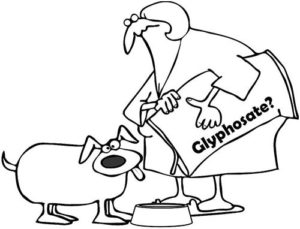
The herbicide Glyphosate, developed and used on farms, gardens, and yards in the U.S. since 1974, is apparently included in some other products as well, including pet food.
There is a hidden ingredient in your dog's food that might be causing more harm than good. Experts at Cornell University confirmed in a study published in the journal Environmental Pollution that small traces of glyphosate are present in commercially available pet foods.
Glyphosate is the main ingredient in Roundup, a popular weed killer. It is a herbicide that has alarmed environmentalists because glyphosate is too toxic not just to pests but also to other animals that may ingest the molecules from the weed spray.
Experts from Cornell, however, stated that the levels of herbicide found in pet foods are still considered safe even for humans. Earlier tests from the Food and Drug Administration (FDA) showed that 99 percent of the processed food products that both humans and pets eat had glyphosate content. However, its contents were found to comply with the Environmental Protection Agency's (EPA) pesticide residue standards, so it's still deemed safe.
Low Dose Toxicity

But Dr. Michael Antoniou, who has done many studies on the herbicide at King's College London, has made a comment on the Cornell experts' published work to negate their findings. He stated that the study authors failed to establish the effects of “low dose toxicity” that glyphosate may cause on the endocrines of both dogs and humans.
Antoniou also pointed out that there have been studies suggesting a daily intake of glyphosate, even if under safe levels, can lead to multiple organ systems failure over time. His previous experiment on rats showed that they developed fatty liver and liver damage. They were injected with Roundup at under four nanograms per kilogram, which was already way below the standard level.
RELATED: FDA Says Skin Cancer Cream Has Caused Deaths in Dogs
More Health Dangers of Glyphosate
In 2015, the World Health Organization (WHO) classified glyphosate as a “probable Group 2a carcinogen” in a document outlining the findings of the International Agency for Research on Cancer (IARC). The move created a controversy and several lawsuits against Monsanto, the makers of Roundup, as many came forward to allege that the herbicide caused their loved one's cancer.
An article published on Goodness Gracious Treats' website has also linked glyphosate consumption and ingestion to other chronic diseases aside from cancer, such as:
Glyphosate accumulates in the tissues inside the body, so it has health implications for the organs. Even a mother's breast milk may have glyphosate. If this ingredient can cause harm to humans over time, then it can cause the same effects on dogs.
Minimizing Exposure to Glyphosate
Unless you're feeding your dog organic food, you've likely exposed your pet to this toxic ingredient. But now that you know it has harmful effects, you can still make changes and minimize the exposure:
- Switch to organic food if you have the budget. You'll save on vet bills and medical treatments in the long run. But if you have to buy commercially processed food, always read the label and pick non-GMO products.
- It might help to give your dog probiotics and other fermented foods to help heal his gut. Ask your veterinarian for recommended supplements that will make the dog's immune system healthier.
- It goes without saying that you should stop using herbicides with glyphosate in your garden or yard. If possible, ask your neighbors to switch to a different weed killer as well.
- If you like walking your dog and hanging out at the park, give your dog a detox bath regularly. You might also want to sway public officials into using safer herbicides in public parks for the sake of the health of the whole community, not just the dogs.
READ NEXT: 7 Hidden Toxins in Your House That’re Poisonous or Cancerous to Dogs













